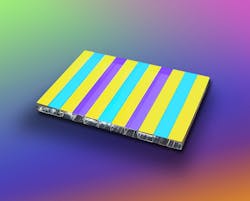Multispectral optical arrays by Deposition Sciences
Manufacturer of highly durable optical thin film coatings, Deposition Sciences, Inc. (Santa Rosa, CA), has announced an expansion of its optical components line with the new Multispectral Optical Filter Assemblies, or MOFAs. DSI’s optical assembly technology combines individually-coated multispectral filter substrates into an array assembly. The new assemblies range from two-filter stacks to eight-filter stacks, or more. For added flexibility, the MOFAs can employ a variety of adhesives including space-qualified adhesives. The durable, complex MOFAs are used in linear and planar-array CMOS detectors, medical instrumentation, commercial, government, and aerospace applications. By combining numerous complex filters into one device, the filters provide distinct capabilities on each array.
-----
PRESS RELEASE
Deposition Sciences Introduces Multispectral Optical Filter Assembly
Santa Rosa, CA – Deposition Sciences, Inc. (DSI), manufacturer of highly durable optical thin film coatings, announces an expansion of its sophisticated optical components line, the new Multispectral Optical Filter Assemblies, or MOFAs. DSI’s advanced optical assembly technology combines individually-coated multispectral filter substrates into an array assembly. The new assemblies range from two-filter stacks to eight-filter stacks, or more. For added flexibility, the MOFAs can employ a variety of adhesives including space-qualified adhesives.
The highly durable, complex MOFAs are used in linear and planar-array CMOS detectors, medical instrumentation, commercial, government, and aerospace applications. The multispectral optical filter assemblies may be customized using a variety of substrate sizes. By combining numerous complex filters into one device, the filters, once assembled, provide distinct capabilities on each multispectral array. DSI can also incorporate stops and apertures on the part surface by utilizing advanced patterned coating technology. For more information about this specialized thin film coating technology, please visit www.depsci.com.
Deposition Sciences, Inc. (DSI) – Santa Rosa, CA – www.depsci.com - For over 25 years, Deposition Sciences has produced the most durable optical thin film filter coatings in the industry. DSI’s coating capability ranges from the ultraviolet (UV), through the visible and includes near-infrared (NIR), midwave-infrared (MWIR) and out to the longwave-infrared (LWIR). At the heart of these capabilities is DSI’s patented MicroDyn® reactive sputtering technology enabling superior multilayer thin film coatings for optics and other thin film technologies.
-----
